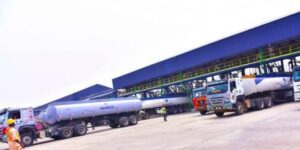Cost of fuel subsidy increased by 890% in five years, as fuel price jumped by 12.1% — SBM Intelligence
The costs Nigeria expended on fuel subsidy increased by 890% over a five year period (2017-2021) in Nigeria as fuel prices had recorded an increase of 12.1%.
The socioeconomic research firm, SBM Intelligence reported this in a report titled “Growing fuel prices and transport costs: Which way Nigeria.”
It stated that between 2017 and 2018, the cost of fuel subsidy had increased by a whopping 405% yet fuel price remained constant all through.
The Federal Government has been forced to continue paying petrol subsidies which have continued to rise over the years.
To retain the pump fuel price at N145 in 2017, the NNPC said that it spent N144.53 billion in subsidising petrol, whereas transport costs ranged from N122 to N138, an obvious rise.
By 2019, the cost reduced by 25%, but the decrease is insignificant in comparison with the initial 405% increase.
2020 saw an alarming spike as the government incurred N1.192 trillion on subsidy, more than double the cost for 2019.
Over this five-year period, petrol prices increased by 12.1%, petrol subsidy by 890% and transport cost by 283%.
The average cost of bus transportation within Nigerian cities during this period rose from N122.83 in January 2017 to N470.83 in December 2021.
In 2017, Abuja had the highest intra-city bus transport cost at N290.55 while Borno had the lowest at N50. In 2021, Zamfara had the highest intra-city bus transport cost at N700.22 while Abia had the lowest at N294.44.
The report added that by 2021, subsidy had gulped N1.43 trillion, a stunning rise of 890%, highlighting that the NNPC has requested N3 trillion from the government to fund the subsidy this year in the aftermath of Abuja shelving its plan to withdraw the subsidy by January 2022 as demanded by the Petroleum Industry Act (PIA) which was signed into law in August 2021.



